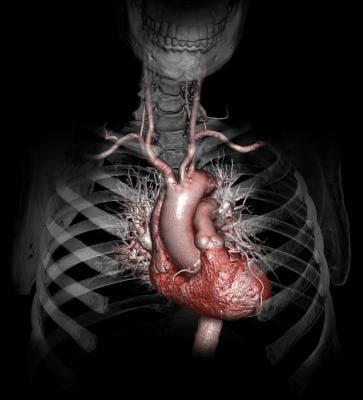
Image courtesy of Vital Images
January 22, 2015 — AstraZeneca announced that the PEGASUS-TIMI 54 study, a large-scale outcomes trial involving more than 21,000 patients, successfully met its primary efficacy endpoint. The study assessed ticagrelor (Brilinta) tablets at either 60 mg twice daily or 90 mg twice daily plus low-dose aspirin for the secondary prevention of atherothrombotic events in patients who had experienced a heart attack one to three years prior to study start. The primary efficacy endpoint was a composite of cardiovascular (CV) death, myocardial infarction (MI) or stroke.
The PEGASUS-TIMI 54 study investigated two different doses of ticagrelor on a background of low dose aspirin versus placebo plus low dose aspirin, in patients aged 50 and older with a history of heart attack and one additional CV risk factor. The study was designed to better understand the management of patients more than 12 months after their heart attack, who remain at high risk for major thrombotic events.
Complete results from the PEGASUS-TIMI 54 study will be submitted to a scientific meeting in 2015 and pending further analysis, AstraZeneca plans to file this data with regulatory health authorities.
The PEGASUS-TIMI 54 study is part of AstraZeneca’s PARTHENON program. The PLATO study, involving in more than 18,000 ACS patients, was the first study in the program and is the basis on which ticagrelor has been approved in more than 100 countries and included in 12 major ACS treatment guidelines globally. Further ongoing PARTHENON studies are investigating ticagrelor for the prevention of cardiovascular events in patients with peripheral arterial disease, ischaemic stroke or transient ischaemic attack and in patients with diabetes and coronary atherosclerosis.
Ticagrelor is not approved for secondary prevention of atherothrombotic events in patients with a history of heart attack beyond one year or for the prevention of cardiovascular events in patients with PAD, stroke, diabetes or atherosclerosis.
Preliminary analysis did not reveal any unexpected safety issues. Full evaluation of the data is ongoing.
For more information: www.azpicentral.com/PI-Central.html


 January 05, 2026
January 05, 2026 









